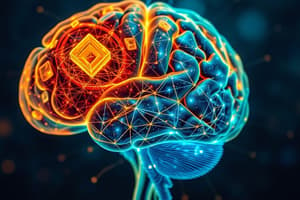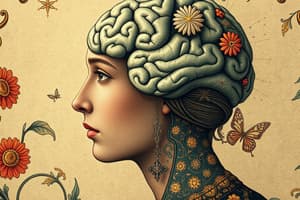Podcast
Questions and Answers
What is the primary difference between Thurstone's theory of multiple intelligences and Gardner's theory?
What is the primary difference between Thurstone's theory of multiple intelligences and Gardner's theory?
- Thurstone believed that mental abilities are interdependent, while Gardner believes they are independent. (correct)
- Thurstone believed in the existence of a general intelligence factor, while Gardner did not.
- Thurstone focused on identifying specific mental abilities, while Gardner focused on the broader concept of intelligence.
- Thurstone's theory was based on empirical evidence, while Gardner's theory was purely theoretical.
What is the significance of the 's' factors in modern intelligence theories?
What is the significance of the 's' factors in modern intelligence theories?
- They are a measure of a person's overall cognitive ability.
- They account for the variability in intelligence scores within a population.
- They represent specific abilities that are not necessarily related to general intelligence. (correct)
- They are the basis of Thurstone's theory of multiple intelligences.
According to Gardner's theory of multiple intelligences, what is the primary evidence for the existence of distinct intelligences?
According to Gardner's theory of multiple intelligences, what is the primary evidence for the existence of distinct intelligences?
- The existence of specific mental abilities that are not significantly correlated.
- The observation that brain damage can affect specific mental abilities without affecting others. (correct)
- The presence of savant syndrome in individuals with developmental disorders.
- Individual differences in cognitive ability.
How does Gardner's theory of multiple intelligences differ from Thurstone's theory?
How does Gardner's theory of multiple intelligences differ from Thurstone's theory?
Which of the following is NOT a key characteristic of Gardner's theory of multiple intelligences?
Which of the following is NOT a key characteristic of Gardner's theory of multiple intelligences?
What is metacognition?
What is metacognition?
Which of the following is NOT considered a 'primary mental ability' according to Thurstone?
Which of the following is NOT considered a 'primary mental ability' according to Thurstone?
According to Spearman's two-factor theory of intelligence, what is the 'g factor'?
According to Spearman's two-factor theory of intelligence, what is the 'g factor'?
What does the 'S factor' represent in Spearman's two-factor theory of intelligence?
What does the 'S factor' represent in Spearman's two-factor theory of intelligence?
How did Thurstone's theory of primary mental abilities differ from Spearman's two-factor theory?
How did Thurstone's theory of primary mental abilities differ from Spearman's two-factor theory?
What is factor analysis, as used in the context of intelligence research?
What is factor analysis, as used in the context of intelligence research?
Why was Spearman's concept of the 'g factor' controversial?
Why was Spearman's concept of the 'g factor' controversial?
Which of the following best describes the term 'intelligence' according to the provided content?
Which of the following best describes the term 'intelligence' according to the provided content?
Flashcards
g factor
g factor
The general intelligence factor that influences overall cognitive ability.
s factors
s factors
Specific abilities that contribute to performance on intelligence tests.
Multiple Intelligences
Multiple Intelligences
Gardner's theory that intelligence consists of various independent abilities, not just one.
Savant Syndrome
Savant Syndrome
Signup and view all the flashcards
Modular Model
Modular Model
Signup and view all the flashcards
Intelligence
Intelligence
Signup and view all the flashcards
Metacognition
Metacognition
Signup and view all the flashcards
Factor Analysis
Factor Analysis
Signup and view all the flashcards
Primary Mental Abilities
Primary Mental Abilities
Signup and view all the flashcards
Spearman’s Two-Factor Theory
Spearman’s Two-Factor Theory
Signup and view all the flashcards
Thurstone's Approach
Thurstone's Approach
Signup and view all the flashcards
Study Notes
Intelligence Definition
- Intelligence is defined as the ability to learn, effectively meet environmental demands, and understand and control one's mental activities (metacognition).
- Metacognition is the ability to understand and control one's mental activities.
- This involves thinking about one's thinking.
- Studying, for example, is a method of meeting academic demands, while knowing when to stop studying and when one is ready for a test is an aspect of metacognition.
General vs. Specific Intelligence
-
Spearman's g Factor: Spearman developed a statistical method (factor analysis) to determine if test items correlate within distinct clusters.
-
People who do well on vocabulary tests often do well on reading comprehension (verbal reasoning cluster).
-
Other clusters include logical reasoning, spatial reasoning, and mechanical reasoning skills.
-
g factor: A general intelligence factor underlying all mental abilities. A bright child generally scores higher across all intelligence aspects than a dull one.
-
s factor: Specific intelligence factors tied to individual mental abilities or competencies.
-
Example of two-factor view: A person might be extremely knowledgeable but struggle significantly with tasks like driving a car or making friends, but excelling in specific areas like languages, musical instruments, and other specialized topics. This exemplifies the g factor not being solely academic. It also demonstrates the ability to understand one's environment
Theories of Intelligence
-
Thurstone's Primary Mental Abilities: Challenged the idea of a general intelligence factor, proposing seven distinct, unrelated mental abilities. He believed the differences between individuals arose from variations in these primary mental abilities.
-
A later reevaluation showed that skills were not completely independent. Note - these original abilities are not considered the definitive set of primary mental abilities
-
Howard Gardner's Theory of Multiple Intelligences: This theory, which grew from Thurstone, suggests multiple independent intelligences rooted in various brain regions.
-
Brain damage can be localized, highlighting specific areas of intelligence rather than overall cognitive collapse.
-
Savant syndrome (as seen in autism) demonstrates people with general cognitive impairment display extraordinary talents in specific areas.
-
Examples include incredibly detailed artistic skills after limited exposures to stimuli. An artist for example, may produce a detailed piece of art after a quick visual observation.
-
Gardner's theory emphasizes cultural relevance: Intelligences are measured in contexts relevant to specific cultures.
Studying That Suits You
Use AI to generate personalized quizzes and flashcards to suit your learning preferences.




